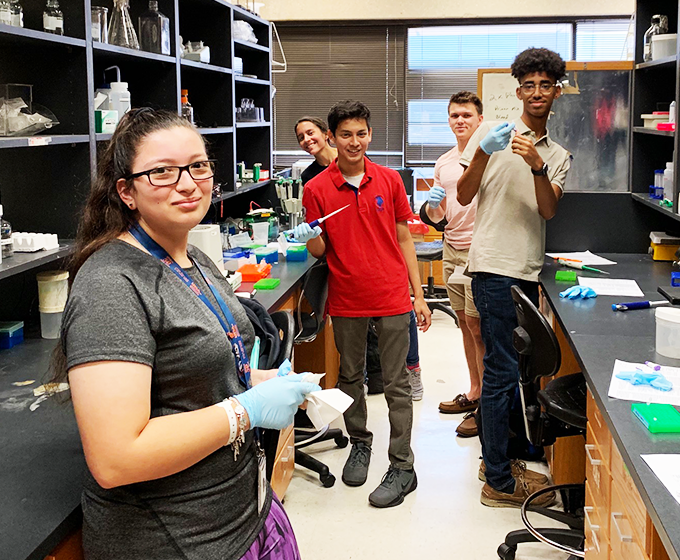
ESTEEMED trainees from the 2019–2020 cohort during their five-week summer boot camp.
Oct. 10, 2019 — To support student success, UTSA is offering a new program to train the next generation of diverse researchers in the biomedical sciences.
The National Institutes of Health’s National Institute of Biomedical Imaging and Bioengineering has awarded UTSA a five-year, nearly $1.3 million grant to create the Enhancing Science, Technology, Engineering, and Math Educational Diversity (ESTEEMED) Program.
ESTEEMED is designed to ensure that talented minority or disadvantaged students obtain the experience and skills they need to succeed in doctoral programs and research-intensive careers in the biomedical sciences.
The participation of underrepresented racial and ethnic minorities in the science and engineering workforce has been a concern of policymakers who are interested in solving emerging challenges in health care.
UTSA is diversifying the pipeline of scientists and engineers entering the workforce by offering this program to undergraduates from populations underrepresented racially, economically or through disability.
The majority of UTSA students identify as Hispanic (56%), contributing to a 64% underrepresented minority student population. Nearly 45% of UTSA undergraduates are first-generation students whose parents or guardians have not earned a four-year degree.
“ESTEEMED is a comprehensive training program that will enable highly talented underrepresented students to pursue their dreams of becoming biomedical researchers,” says Gail P. Taylor, ESTEEMED program director. “The UTSA research environment, which is highly inclusive for undergraduates, is an exceptional training ground for these future researchers. Our first-year trainees have exceeded our expectations, and we are now seeking our second cohort for fall 2020.”
High-achieving students will be recruited from South Texas high schools and many freshmen will be preadmitted to the UTSA Honors College majoring in biology, microbiology/immunology, chemistry, biochemistry, physics, psychology and biomedical engineering.
UTSA freshman and sophomore trainees develop their skills as scholars and scientists through faculty and peer mentoring and training in biomedical research laboratories.
Students are offered a cohesive training program that fulfills these specific aims:
ESTEEMED has seven training positions for high-achieving freshmen in its first year and 14 training positions (seven freshmen, seven sophomores) thereafter over the course of the five-year grant.
ESTEEMED scholars who develop strong academic and research credentials will be given priority consideration for entry into the junior/senior-level UTSA Maximizing Access to Research Centers program as well as other funded training opportunities at UTSA.
Trainees in MARC and other student research programs at UTSA have very strong placement records into some of the top biomedical research programs in the country.
Learn more about the NIH/UTSA ESTEEMED Program.
Celebrate UTSA’s 50th Anniversary and share social media posts about the 50th using the hashtag #UTSA50.
Connect with UTSA online at Facebook, Twitter, YouTube, Instagram and LinkedIn.
UTSA Today is produced by University Communications and Marketing, the official news source of The University of Texas at San Antonio. Send your feedback to news@utsa.edu. Keep up-to-date on UTSA news by visiting UTSA Today. Connect with UTSA online at Facebook, Twitter, Youtube and Instagram.
Enjoy snacks while connecting with Adobe reps and student ambassadors. Download or log into the Adobe Express app to snag swag and unlock exclusive back-to-school templates. It’s a fun, fast way to get creative and start the school year with bold moves.
Central Plaza, Main CampusCelebrate the merger of UTSA and UT Health San Antonio with a pop-up featuring free t-shirts, exclusive swag, and interactive photo opportunities. Open to all students, faculty and staff. Supplies are limited!
Sombrilla Plaza, Main CampusHuddle Against Hunger is a fundraising competition with Texas State that benefits our Roadrunner Pantry. Donations this week will help UTSA earn additional prize monies provided by RBFCU.
In-Person and VirtualJoin UTSA Libraries for an update on federal public access policies and how the library can assist with compliance.
Virtual EventWe invite you to join us for Birds Up! Downtown, an exciting welcome back event designed to connect students with the different departments at the Downtown Campus. Students will have the opportunity to learn about some of the departments on campus, gain access to different resources, and collect some giveaways!
Bill Miller PlazaThere are many citation managers. Which one is right for you? This workshop will explain what a citation manager is and how it can help you organize your citations, insert citations as you write your paper, and generate your bibliography.
Virtual EventPubMed is an essential database for anyone conducting biomedical or health-related research. This workshop will teach attendees how to effectively navigate this free resource and locate peer-reviewed articles using advanced search features, MeSH subject headings, and Boolean operators.
Virtual EventThe University of Texas at San Antonio is dedicated to the advancement of knowledge through research and discovery, teaching and learning, community engagement and public service. As an institution of access and excellence, UTSA embraces multicultural traditions and serves as a center for intellectual and creative resources as well as a catalyst for socioeconomic development and the commercialization of intellectual property - for Texas, the nation and the world.
To be a premier public research university, providing access to educational excellence and preparing citizen leaders for the global environment.
We encourage an environment of dialogue and discovery, where integrity, excellence, respect, collaboration and innovation are fostered.